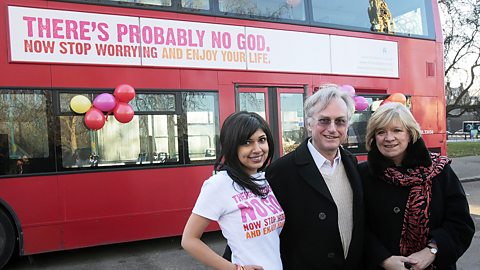Non-religious people are not an organised group of people but a diverse mix, with a wide variety of beliefs, values and ways of looking at the world. For that reason, it is hard to talk about non-religious people as a single group. Still, it is probably fair to say, many non-religious people believe it is possible to live a good and fulfilling life without following a religion, and without a belief in a god or gods.
Five key facts
Watch to find out how Cerys, a Humanist, lives her life according to her values and not those of a religion.
My name is Cerys and I don't follow a religion, but like many non-religious people I still have beliefs that I live by. I'm a Humanist, which means I believe that humans can live good and meaningful lives without believing in God or following a religion. Humanists decide what is right by thinking about the consequences of what we do, in whatever situation we're in. We try to consider how people might feel, how they might be affected and what would be best for everyone.
So, there's no worship. Humanism isn't an organised religion. We don't meet up every week in a special building. I give my life meaning by making the most of my time here on Earth, by enjoying and taking responsibility for things here and now, instead of believing that we'll be rewarded in an afterlife.
There are no holy books either, but Humanists can learn from people and the many different forms of human knowledge and experience such as science, art, philosophy and literature.
Humanists believe in freedom of choice, so I can choose to wear whatever I like, though some Humanists might want to check where their clothing has come from and whether it's been ethically produced. So, for example, were the people who made them paid properly and treated fairly?
And it's the same with food. There are no rules, but today more and more people are thinking carefully about the food we eat and how it's produced. We only have one planet and it's up to us humans to look after it!
What do non-religious believe and how do they put their views into practice?
Click the image below to discover more about non-religious beliefs.
Non-religious people may be atheists, which means that they don't see any reason to believe there is a god. They can also be agnostic, meaning they accept that we can't know for certain whether or not a god exists. Many people are both agnostic and atheist at the same time. They accept certainty is impossible, but see no good reason to believe
Some non-religious people may even believe in a god or gods, while wishing not to follow any religion. Some non-religious people can be thought of as ‘spiritual but not religious (SBNR)’. If a person is SBNR, this means that they believe that there is more to being human than a physical life: there is also a non-physical, spiritual dimension; things about the experience of being human that goes beyond the physical and emotional. For some, this can mean believing in a soul or a spirit.
Some non-religious people may join groups and communities which bring like-minded people together. Probably the biggest and most well-known group of this kind is called Humanism. Humanism is about putting trust in humanity to understand the universe without the need for belief in supernatural phenomena like gods, heaven, hell, or reincarnation. Instead of referring to commandments or laws in holy books, Humanists make moral choices by using reason and logic, empathy (trying your best to understand how others feel) and compassion. Many non-religious people who do not identify as Humanist may also share these views.
Living a non-religious life today
It is very difficult to say for sure how many people are non-religious, but in the 2021 census, the Office of National Statistics found that 22.2 million people did not follow a religion. In the 2019 British Social Attitudes survey, 52% of people asked stated they had no religion.
Being non-religious can mean very different things to different people. Some people might argue that the more we learn about science, the less we need religion to explain the world to us. Others live their lives for the here and now and may not give much thought as to why they do not believe in a religion.
Non-religious beliefs in pictures

Image caption, Beliefs
Humanists believe that there is probably no God. They do not believe in life after death, and live life for the here and now using reason and showing compassion for others.
1 of 3
Play Bitesize secondary games. game
Have fun playing science, maths, history, geography and language games.
